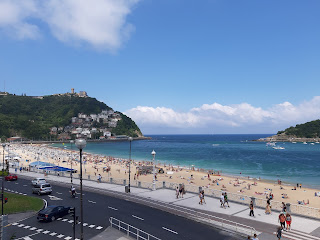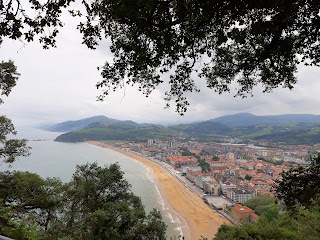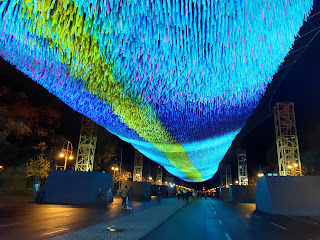Traveling to the #paisvasco / #basquecountry
PAIS BASQUE / PAÍS VASCO / EUSKADI
What does one normally associate with the concepts "txacoli", "txangurro" and "ikurriña"?
Trust me, not even an experienced linguist could handle that question… well, of course, provided the linguist is not familiar with Euskera, the Basque language.
The Basque country, an ethnic enclave situated on the Atlantic coast/Biscaya Gulf, home to a people that still speaks the non Indo-European language probably dating back to the 4th century BC.
They have always been a model of cultural homogeneity... having learned the art of war from the Romans, they have fought the Moorish conquest and then have managed to maintain a certain degree of autonomy as a part of the Spanish Kingdom over centuries.
Unfortunately, keeping this cultural heritage came with certain price during Franco's dictatorship… and it was not only the fact that Irun burnt to the ground while Hendaye, the nearest French town across the border, was on holiday and was watching: the political repression, thus the "sleep of reason", did produce monsters, just as Goya said - ETA was founded and starred to make its presence known all over Spain, from 1959 to 2018…
Nowadays, one is not reminded of this bloody background of the Spanish Basque country. On the French side, Biarritz impresses with its tourist-friendly beaches, bourgeois lifestyle and bustling nightlife (especially around the marketplace, where people wait patiently in line for a plate of that famous foie gras, cheeses and a glass of wine).
Bayonne, the more traditional looking neighbor, reminded me more of Besançon than of any Basque city on the other side of the border: the only obvious aspects referring to the Basque identity were the Euskera speakers, the shops selling Basque products and the flags with messages in Euskera one can see hanging on some balconies close to the cathedral or the Nive riverside.
Those flags asking for the transfer of the imprisoned ETA members to Basque cities, where their families can visit them, are more seldom in San Sebastian, a metropolis of the jazz, refined cuisine and elegant holiday making, but a vital part of the centers of towns like Zumaia and Getaria, renowned for the natural wonders, as well as for being true bastions of Euskera and the Euskadi "independentzia".
Bilbao is now known for the Guggenheim Museum and the vibrant music scene, Santurzi and Portugalete, for the architecture, the ports, the local summer festivals, the nightlife and the exquisite gastronomy, Hondarribia - for its fortress-like old town, the beach as well as its pinchos bars.
The Spanish Basque country has managed wonderfully to enter the tourism industry and stun thanks to its "soft-skills" and its personalities: for instance, many Spanish (nota bene, not Basques!), when reaching the beach town of Zarautz, must take a look at (if not even take a photo with) the statue of the popular chef Carlos Arguiñano.
The Basques have been a part of the Spanish pop culture ever since the beginning of the post-Franco era and the last years have seen comedies about the Basques like "8 Apellidos Vascos" and "Fe de Etarra" not only making it to national blockbusters, but also to local popularity.
The Basque welcome anybody interested in what their land has to offer, most of them considering the ETA past a huge error. The autonomy the central government concedes the region facilitated a quick development and spared the region the consequences of the crisis the rest of the country is still struggling with… here, people have higher living standards, the job market is better organized and thus more dynamic, and thanks to its natural beauties, the entire region has become a sought after living place - especially San Sebastian - (aspect reflected by the real estate prices, a lot higher than in other coastal regions of the peninsula, comparable in beauty and tourism potential).
The Basque people care deeply about their identity and distinction from the Spanish - most schools teach in Euskera and many kids get into contact with the Spanish language in high school, though one can't notice any reluctance when speaking it (as the case in Catalonia).
"Independentzia" is a dream many Basque dream, but being as realistic and practical as they are, most are aware of the fact that economically, it would not be feasible. People here are not confused about their identity, they display the "ikurriña", the Euskadi flag, in a natural way (though I must also state, I saw few Spanish flags - only in front of official buildings - , which definitely makes matters even clearer) - after all, they're at home and have nothing to prove to anybody.
Here there's no such thing as "I'm both Spanish and Basque", as one might hear in some places around Catalonia: who's born in the Basque country is Basque, even if not all members of the young generation speaks Euskera…
It's somehow comforting to discover this kind of strong sense of self (now manifested peacefully) in a country where the Spanish nationality normally supersedes belonging to a certain region: patriotism subordinates regionalism, which is not necessarily natural, considering the concept of "nation" is more of a political artefact that has mostly driven to nationalistic tendencies… if only dictatorships didn't try to deny and annul this kind of ethnic variety… neither ETA, nor PKK wouldn't have existed and so many lives would have been spared...











Comments
Post a Comment